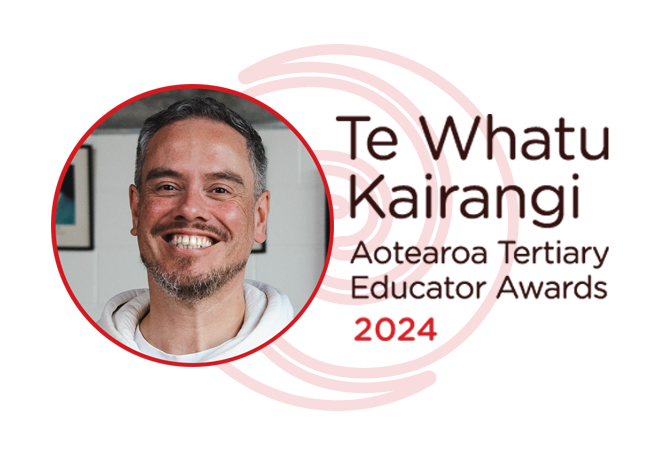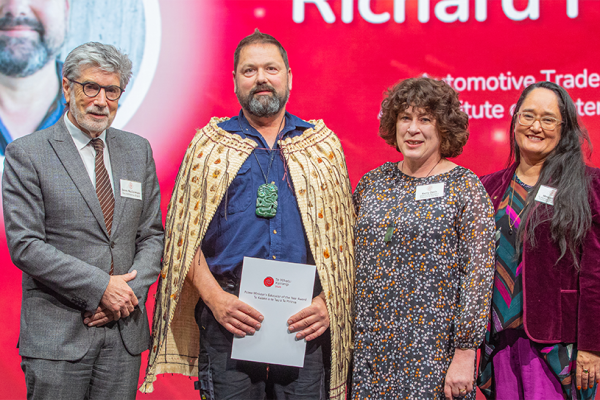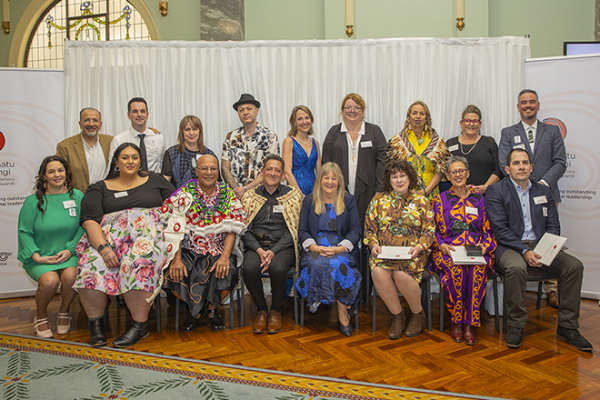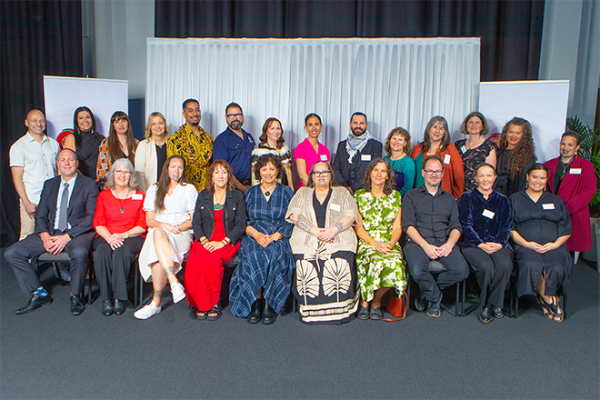Dr Phil Borell
A successful blend of Mātauranga Māori and sports
Kaupapa Māori Award winner
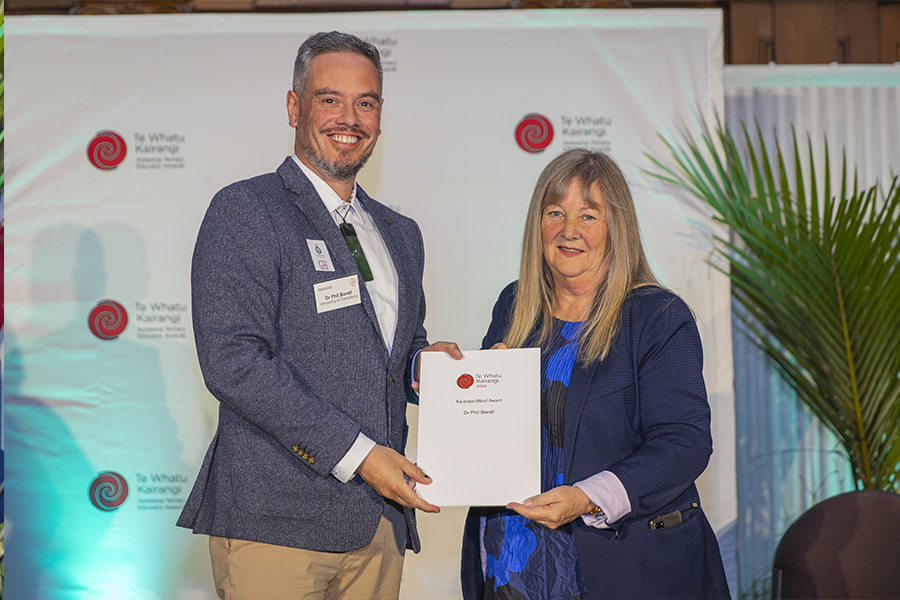
Senior Lecturer, Aotahi School of Māori and Indigenous Studies, University of Canterbury
Ngāti Ranginui
“A large part of my influence is simply being visible in and to my community: I exemplify the importance of kanohi kitea (being seen in-person) as a tāne Māori, an academic, and a sporting leader.”
Phillip never imagined that his professional life would coalesce at a university around two of the biggest drivers in his life—sport and te ao Māori. Not only that, but his academic pursuits overlap with the other aspects of his life. As well as being a Senior Lecturer in the University of Canterbury’s Aotahi School of Māori and Indigenous Studies, he is a rugby league coach, an equity-focused small business owner and hauora navigator, a kaihaka, a husband, and a pāpā. He is guided by kaupapa Māori principles in each of these roles.
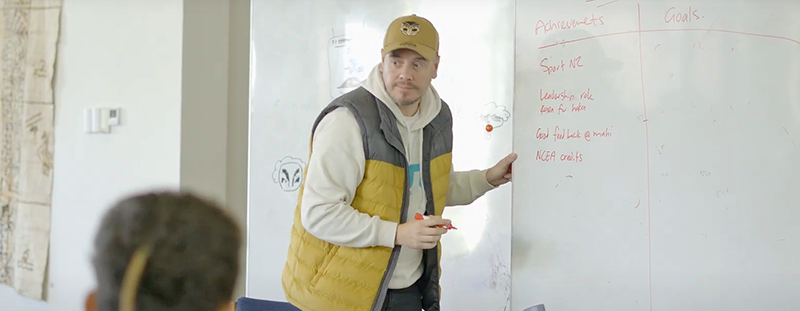
Having studied and worked at UC for more than half his life, Phillip brings a unique set of research and personal interests to Aotahi and incorporates these into his teaching through the Faculties of Arts, Law, and Health. His main contribution, taught since 2011, is a course on Te Tiriti with four co-codes, contributing to the degree in Māori and Indigenous Studies and to majors in Sociology, History, and Cultural Studies. The course is compulsory for the Bachelor of Criminal Justice and the Bachelor of Social Work and, in 2025, will be a core paper in the new Te Ao Hākinakina Māori sports major which he developed for the Bachelor of Sport. Because this course is compulsory for several degrees, Phillip has to reach out to less motivated students through a teaching pedagogy focused on whanaungatanga, aroha, engagement, and a sense of ūkaipō (safe spaces) for ākonga. Pass rates for all students have increased, and the equity gap for ākonga Māori has narrowed from 14% in 2018 to 4.8% today.
Phillip believes his role as a teacher is to demonstrate educational potential both for students and for his community through the example of his own life. In class, he lives his own personal values of aroha and manaakitanga (care and support), whakamana tāngata (empowering people), and ngākau pono (loyalty and integrity). He also embodies the concept of tuakana-teina (role-modelling) in his day-to-day life. He lives in the east side of Christchurch, which has a high proportion of Māori and Pasifika families, lower levels of educational retention, greater poverty, and a myriad of other negative social outcomes. By providing a gateway to education merely by being tūturu (true to himself) he aims to transform the tertiary setting into a culturally safe space.
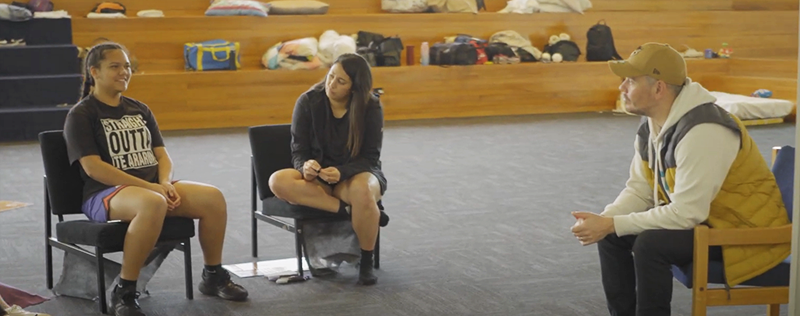
Phillip’s teaching practice is driven by te ao Māori, whakaaro Māori and tikanga Māori. He uses pūrākau (oral traditions/storytelling) and, in his Sport and Culture in Aotearoa paper, encourages students to draw upon their own experiences to shape their understanding of sport and sport coaching practice. This requires them to recognise the synergy between personal pūrākau and academic literature. Through pūrākau, Phillip introduces his students to new (though centuries-old) ways of learning and re-evaluating how we learn. Two further key elements of kaupapa Māori that influence Phillip’s teaching practice are manaakitanga and kaitiakitanga (guardianship). His teaching style, personality, and approachability have enabled him to break down barriers that often exist between lecturer and student. He has been awarded Overall UCSA Lecturer of the Year (2021 and 2022), Lecturer of the Year Faculty of Arts (2022), Lecturer of the Year College of Arts (2021) and the University of Canterbury Teaching Medal (2023), as well as being a finalist for many other awards.
Phillip teaches in the Master of Māori and Indigenous Leadership (MMIL) programme, which teaches and assesses entirely through a kaupapa Māori lens. This degree is a wānanga-based programme that equips mid-career Māori professionals with the skills, knowledge, and attributes they need to take on leadership roles within the Māori economy. He teaches wānanga on Indigenous theories of leadership, Indigenous systems change and mana motuhake (collective autonomy and self-determination), a wānanga he personally developed which combines traditional academic lecture-style teaching with the deep-dive components of modern wānanga. He draws on te reo, tikanga and mātauranga Māori across his teaching practices and incorporates kupu and whakaaro Māori into his teaching as his part in normalising all things Māori in mainstream New Zealand culture. In the Bachelor of Sport Coaching, he draws on Māori models of health, such as Te Whare Tapa Whā and Te Wheke, to give students a framework through which to understand wellbeing, coaching and sportsmanship and extend these models based on their own insights and pūrākau.
Phillip contributes his knowledge of tikanga and mātauranga across campus, most notably through teaching the Te Tiriti course, which is a vital component of the Bicultural Confidence and Competence (BCC) pillar of UC’s Graduate Profile. A more niche utilisation of this occurs in the course Sport and Culture in Aotearoa/New Zealand, which offers cultural awareness that is essential to professional Kiwi sporting careers. He has been a member of UC’s Human Research Ethics Committee for three years and was the Ngāi Tahu Consultation and Engagement Group Māori consultant for Māori ethics (2022–23). Phillip also mentors junior colleagues. He wove together the partnering of sport, whakaaro Māori, and te ao Māori in the development of Te Ao Hākinakina, a new major focused on Māori sport in the Faculty of Health. From 2026, it will also feature a new built-for-purpose 300-level course in Māori sporting practices which will provide a uniquely Māori approach to tertiary sport education.
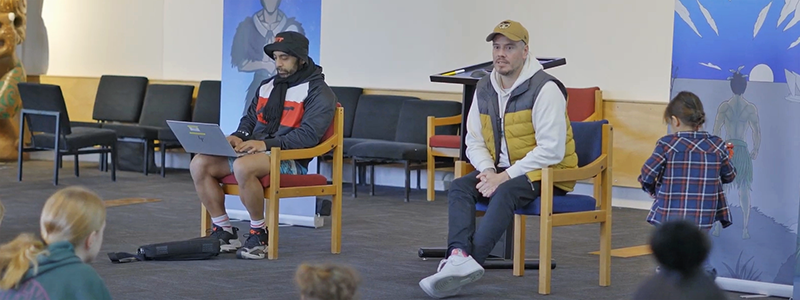
Beyond UC, Phillip has been invited to deliver guest lectures at Toyo, Rikkyo, Sendai and Josai Universities in Japan, and other universities in New Zealand. He is regularly invited to speak at community events, has acted as a consultant for Sport NZ, Oranga Tamariki and the Ministry of Social Development, and is consulted by the news media. He is the chairperson for Canterbury Rugby League and former deputy-chair for Te Pao a Tahu kapa haka. The ethos of Phillip’s teaching extends into the community. In 2017, with his wife Stephenie and Heperi Harris, he founded The Kutt Kollective with the aim of offering hauora solutions for Māori. It’s projects include a whānau-friendly community gym for the under-served residents of Christchurch’s eastern suburbs, facilitation of leadership and wellbeing wānanga for rangatahi using kaupapa Māori models, and sponsorship of local sporting teams. He also coaches rugby league and his interactions with young Māori athletes feed back into his teaching. He recently facilitated the MSD-funded Tama Tū - Hapori Ora wānanga in which kaupapa Māori principles and a Māori space were used to bring together rugby league players and challenge the negative stereotypes of Māori and Pasifika men in the sport. True to the concept of ‘ako’, he is both the teacher and the student in all cases.
“It is inarguable that it is beneficial for Māori to see and experience aroha, manaakitanga, whakamana tāngata, and ngākau pono within academic and sporting spaces.”
